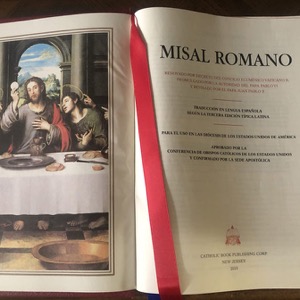
 HE NEW Spanish translation of the Roman Missal, Third Edition for the United States has been available since May, 2018. Its implementation becomes mandatory in the United States on the First Sunday of Advent, December 2, 2018. (Its use has been optional since the Vigil of Pentecost, 2018)
HE NEW Spanish translation of the Roman Missal, Third Edition for the United States has been available since May, 2018. Its implementation becomes mandatory in the United States on the First Sunday of Advent, December 2, 2018. (Its use has been optional since the Vigil of Pentecost, 2018)
Like the English Translation, implemented in 2011, the new Misal Romano, tercia edición contains a great deal more music than any previous edition.
The Zipoli Institute has posted a wonderfully useful site that includes (unaccompanied) recordings here. You can hear them in higher and lower pitched tones.
The Archdiocese of New York has outlined a number of features in the new edition. Among them:
“In an effort to encourage the singing of the Ordinary of the Mass, the US Misal Romano will include more musical notation than any other Spanish language Misal Romano currently used throughout the world.”
TO THAT END, I HAVE ARRANGED some accompaniments for the chants for the Ordinary of the Mass from the Misal Romano. These include guitar chords.
* * Acompañamientos para el Ordinario de la Misa • Misal Romano, tercia edición
In addition, the United States Conference of Catholic Bishops (USCCB) has posted free downloads of all the chants of the Mass with many accompaniments for guitar and organ. These accompaniments were prepared by Marc Cerisier, who also beautifully engraved all of the music found in the misal.
You may find either set of accompaniments useful. While I often find congregations sing more easily to unaccompanied chant, accompaniments can be helpful especially in the learning stages. Furthermore, guitar accompaniment alone can be useful to allow more freedom with the natural accents and rhythms the language. (Guitar and light strings on the organ can also be a very beautiful combination.)
NOTE THAT THE USCCB ACCOMPANIMENTS are written in the “key” of the Vatican Edition. Of course these pitches are really only indicative of the mode and can be sung with any comfortable starting note. As such, it is wise to make adjustments as necessary to suit your congregation.
My accompaniments are taken down a step in most cases to be more comfortable for most congregations. I also added some rhythms indicated by Solesmes or where obvious for the text. (The Roman Missal chants do not have any indications for rhythm as you will see in the USCCB scores. One may find amusing that Theodore Marier would affectionately refer to this approach to notation as “announcing pitches.”)
Finally, I find the two most common mistakes are singing such chants too high and too slowly. This forces a congregation to push and support breath in ways that they are not equipped to do. The result is the people give up on singing altogether. So, sing it lower if necessary, and move the chant along with energy! Finally, take the cue from the people, and allow them to sing naturally.

ADDENDUM
You can also find a number of accompaniments to the Roman Missal Chants in English here
Soli Deo gloria
